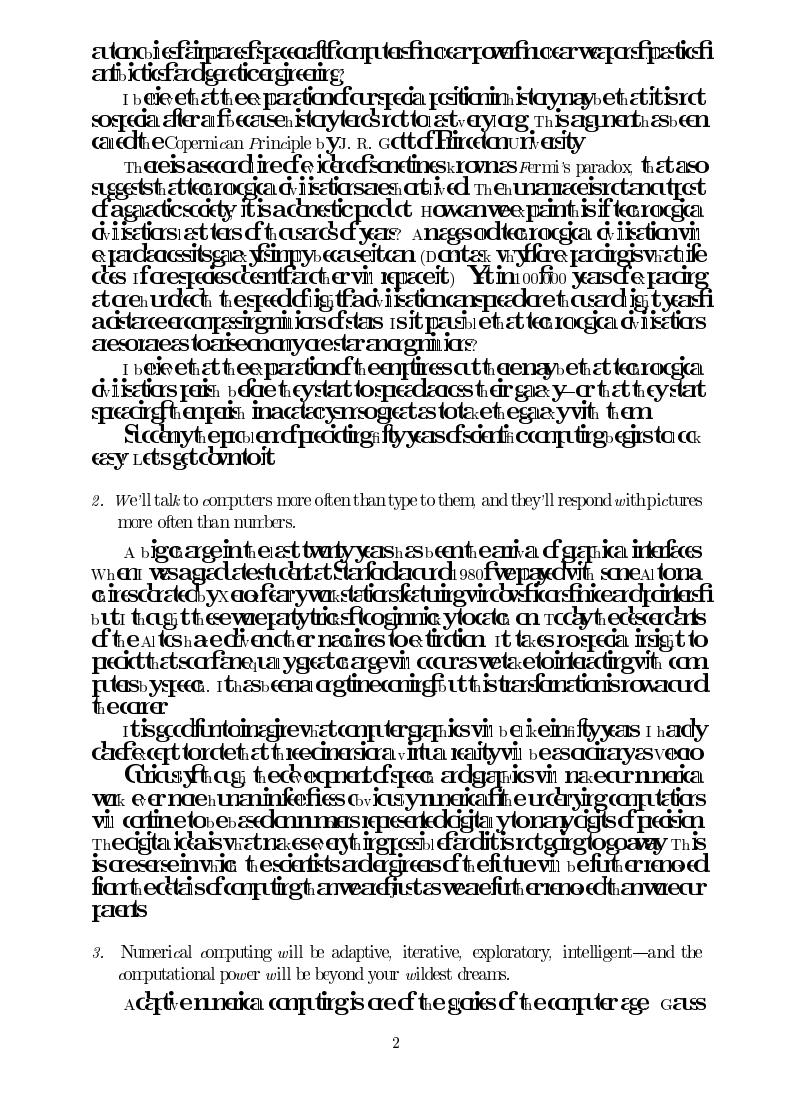正在加载图片...

atadi faiparefpacaafcoputasfnccarpovfinccarveparsfpasticsfi at cticsfardgereticergireerg? Iieteeparatiandarspeda [sitiain isaynaybetatitisrct sospeca aterafecaiseh iaytercsrctta atveryiag Thisag nerthasbeen caedteCopernican Frinciple by..R.GcttoFircelcuriesity Theeisasecad irede icercefscnetineskrovnas Frmi's paradox tataso sugseststatlecrocsica cviiatiarsaesh ated Thehuaaceisrctanatrcst cviisatiasiattasdtasarcsd yas Anagsodtcrocia cviisatianvi rtddyceien ootas wiyde rrcresvono atarenurdect tesreddiig tfacviisatiancansneadaretasard ig tvasfi aesoraeas toakemayaestaranagnmiars? 61t器。LB98 peacrg theresh mnacalacysmsogeatastotaet esaayvit te Siccenytepolemdpecctirgi fty yasdscet ccaptirgpesjrsta ca casy Letsgetcovntoit 2.We'lltalk to compiters more oftenthan type to them and they'll respond withpictures more often than numbers. A bigcarseint elast twarty yashasbcnteaiva dgamka inkafces tona ciresctrakedyxeafearywkstatiarskatugvircoskarstnkeard anasfi biti thag ttheseweratytricsfkognnic ylocalc a Tccayt ecescercaris dteashaediencter ncires ioe tirctian it tasroseda irsigt to peccttatscafane a ygeatcagevin ccarasveta eloireactirgvit cam ecarer tisgcdfintoingireviatcaptergasvi eieinfyyas Ihady caefecettordet att recnersicravima raityvi beasadraryasveao Gias ft ag teceexnetdsec adgaisvn nearnnaia wk &ernaenianinkefiess dviasynnekafeuceryirgcatatias vil cafmnetobebasedanmasiepeserkdagita ytonayggitsd peasian saresersemnvic tescatistsadagreasd telituevi befut rIeoed fiat ecelaisdcaptirgt anveadistasweaefuth erienoedt anwrear 3.Numerical computing will be adaptive,iterative,exploratory.intelligent-and the Acrtiennaka cantirgis aedtegaisdtecapter age cass automobiles airplanes spacecraft computers nuclear power nuclear weapons plastics antibiotics and genetic engineering I believe that the explanation of our special position in history may be that it is not so special after all because history tends not to last very long This argument has been called the Copernican Principle by J R Gott of Princeton University There is a second line of evidence sometimes known as Fermi s paradox that also suggests that technological civilisations are short lived The human race is not an outpost of a galactic society
it is a domestic product How can we explain this if technological civilisations last tens of thousands of years An ages old technological civilisation will expand across its galaxy simply because it can Don t ask why for expanding is what life does If one species doesn t another will replace it Yet in years of expanding at one hundredth the speed of light a civilisation can spread one thousand light years a distance encompassing millions of stars Is it plausible that technological civilisations are so rare as to arise on only one star among millions I believe that the explanation of the emptiness out there may be that technological civilisations perish before they start to spread across their galaxyor that they start spreading then perish in a cataclysm so great as to take the galaxy with them Suddenly the problem of predicting fty years of scientic computing begins to look easy Let s get down to it
We l l talk to computers more often than type to them and they l l respond with pictures more often than numbers
A big change in the last twenty years has been the arrival of graphical interfaces When I was a graduate student at Stanford around we played with some Alto ma chines donated by Xerox early workstations featuring windows icons mice and pointers but I thought these were party tricks too gimmicky to catch on Today the descendants of the Altos have driven other machines to extinction It takes no special insight to predict that soon an equally great change will occur as we take to interacting with com puters by speech It has been a long time coming but this transformation is now around the corner It is good fun to imagine what computer graphics will be like in fty years I hardly dare except to note that three dimensional virtual reality will be as ordinary as Velcro Curiously though the development of speech and graphics will make our numerical work ever more human in feel less obviously numerical the underlying computations will continue to be based on numbers represented digitally to many digits of precision The digital idea is what makes everything possible and it is not going to go away This is one sense in which the scientists and engineers of the future will be further removed from the details of computing than we are just as we are further removed than were our parents
Numerical computing wil l be adaptive iterative exploratory intel ligentand the computational power wil l be beyond your wildest dreams
Adaptive numerical computing is one of the glories of the computer age Gauss ����������������������������������